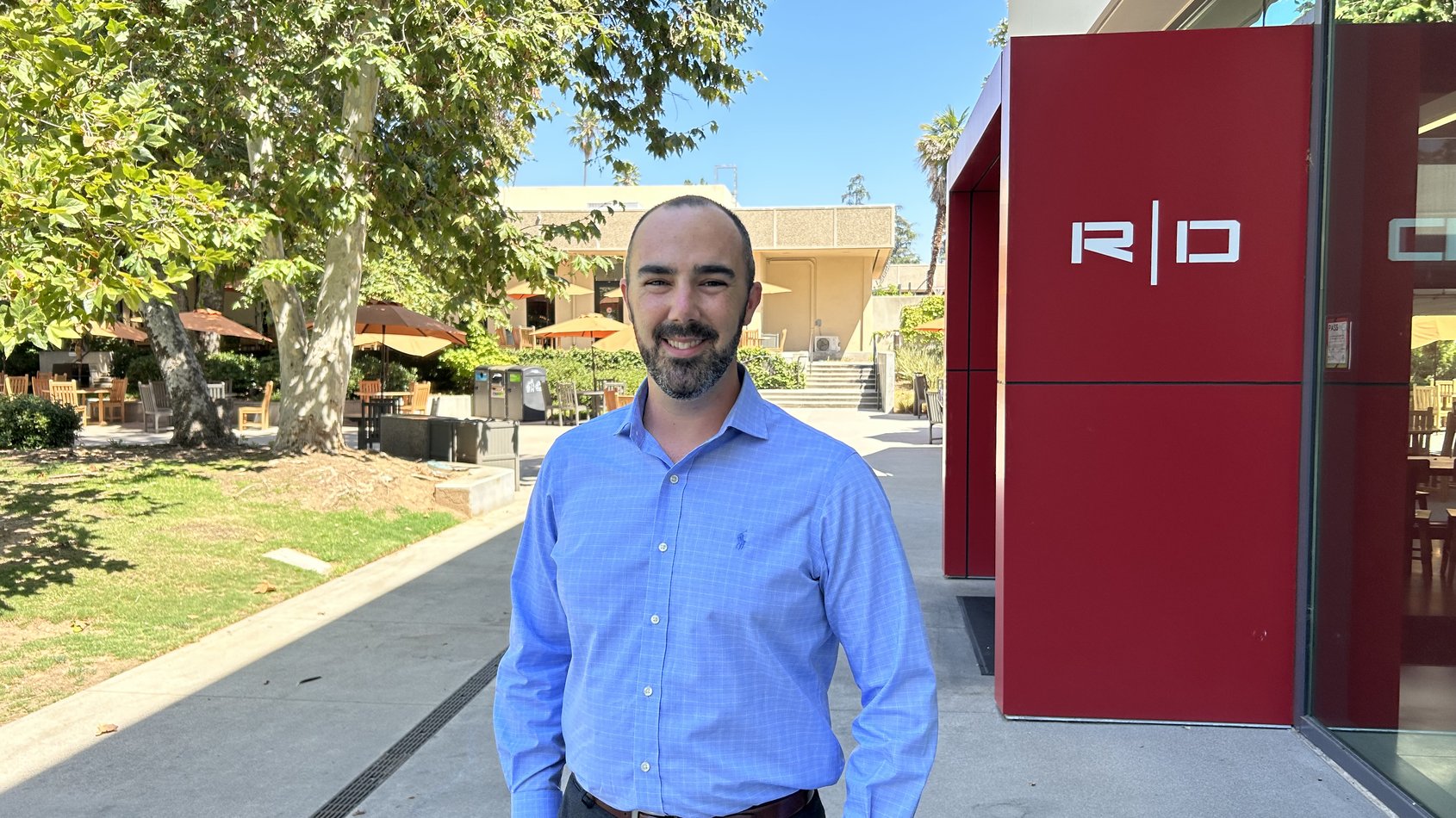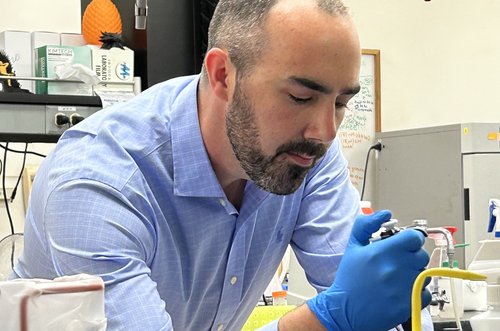Graduate Fellowships
Veteran and Ahmanson Scholar Alex Johnson on Choosing Caltech and Giving Back

His community college professor’s encouragement plus some fellowship support helped put Alex Johnson on a path to graduate school. Now he wants to pay it forward.
Johnson was attending Skagit Valley College’s Whidbey Island Campus in Washington State and wrapping up seven years of service in the U.S. Navy when a chemistry professor encouraged him to consider pursuing an advanced degree. Johnson took this advice to heart, went on to study biochemistry at Western Washington University, and is now a third-year bioengineering graduate student at Caltech.
The Cutting Edge
Johnson chose Caltech for graduate study because “it is on the cutting edge.” He adds, “There are interdisciplinary research opportunities here like nowhere else.”
Johnson’s work is a case in point. His faculty advisers are Richard Murray, the Thomas E. and Doris Everhart Professor of Control and Dynamical Systems and Bioengineering and holder of the William K. Bowes Jr. Leadership Chair of the Division of Biology and Biological Engineering, and Victoria Orphan, the James Irvine Professor of Environmental Science and Geobiology and holder of the Allen V. C. Davis and Lenabelle Davis Leadership Chair for the Center for Environmental Microbial Interactions.

Johnson is prototyping systems to record the communications and chemical exchanges between two interdependent types of deep-ocean microbes that consume methane and convert it into biomass. His goal is to reengineer metabolisms in these microbes to produce fuels and other materials we use every day.
“We need to understand more about how these microbes interact in their environment,” Johnson says. “When one microbe is introduced to a region or spot in the soil, how do the other microbes respond? Are they consuming materials that are being released by other microbes? Are they benefiting from it?”
Time and Space to Explore
Thanks to fellowship support from The Ahmanson Foundation’s Veteran Scholarship Initiative, together with additional funds from the National Science Foundation, Johnson has enjoyed time and space to explore. “The financial support gives me a lot of freedom to go after the research I want to do,” he says. “At Caltech, there is so much emphasis on graduate students designing their own programs, without the time pressure to produce something immediately. It lets you settle into a research project that is bespoke for every student.”
Giving graduate students latitude to take intellectual risks and partner with the research groups of their choice is a major focus of the Initiative for Caltech Students. The fundraising campaign aims to generate $60 million in endowed fellowship support, which will fund every graduate student’s first and second years.
After Caltech, Johnson plans to return to the Seattle area, where he was stationed for some of his time in the Navy. He hopes to make a positive impact there by bringing his understanding of climate, biology, and biotechnology to the growing biotech field. He is considering starting his own company, or possibly helping other people with their startups. Another option he is considering is to pursue opportunities in government to help guide policy, develop the bioeconomy, and support sustainability.
Giving Back
On a fishing trip before he moved from Washington to California to attend Caltech, Johnson ran into the community college professor who had encouraged him continue his studies. When Johnson told him he was going to Caltech, the professor was wowed: “That’s huge,” he said.
The encouragement to continue studying, plus the financial support Johnson received, has informed his desire to give back, especially to fellow veterans. Together with Ken Hargreaves, associate vice president for civic engagement and external affairs, Johnson is working on plans for a project that will bring veterans to campus to conduct research over the summer. The effort is similar to Caltech’s WAVE Fellows and Rising Tide programs, but aimed at veterans, helping them forge connections with the scientific community.
“We envision the start date of this program coinciding with the end of the STEM boot camp Ken manages for Caltech in partnership with the Warrior-Scholar Project,” Johnson says. “It will allow veterans to take the skills they learn in the boot camp and employ them in a research lab setting for six to eight weeks.” Johnson and Hargreaves also want to increase outreach to community colleges near military bases in Southern California.
“Alex is motivated to make more veterans aware of the higher-education STEM opportunities that are available to them,” says Hargreaves, who is also a veteran. “I look forward to continuing to work with him and other veterans to help make those connections.”
“Many people I worked with helped me get here,” Johnson says. “That’s something I would like to be able to give back.”
This archived content may contain outdated information or references that may not reflect current practices or programs.